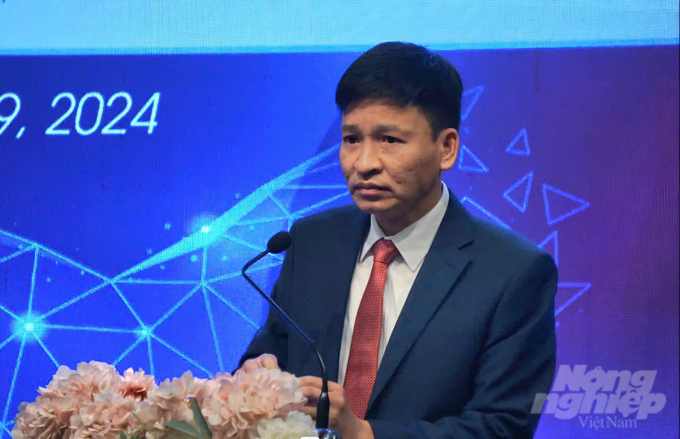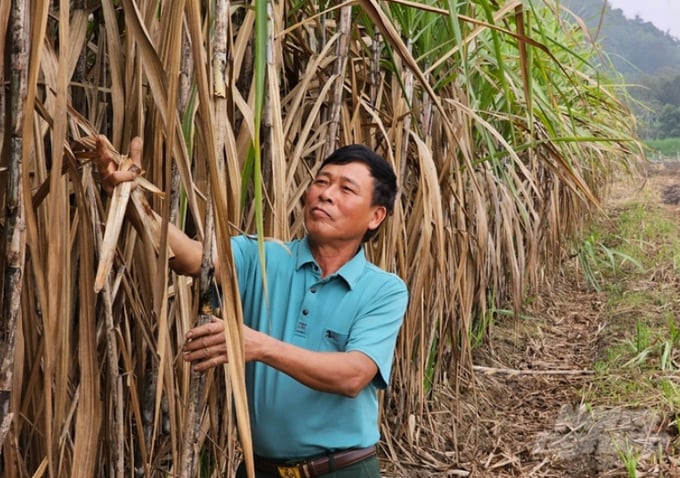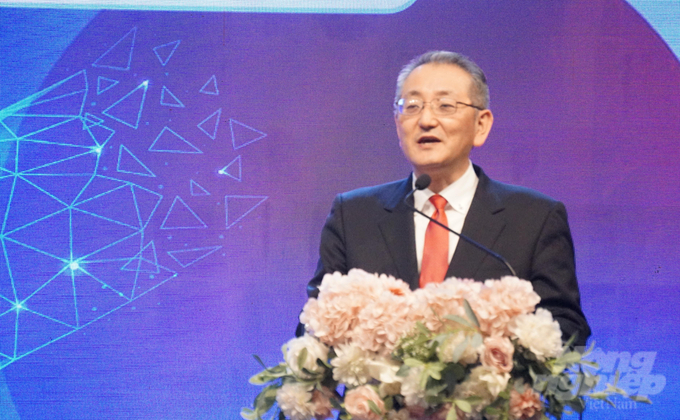June 19, 2025 | 12:55 GMT +7
June 19, 2025 | 12:55 GMT +7
Hotline: 0913.378.918
June 19, 2025 | 12:55 GMT +7
Hotline: 0913.378.918
On December 19, Lam Son Sugarcane Joint Stock Company (Lasuco), in collaboration with Idemitsu and Sagri, officially signed a contract to implement a groundbreaking carbon-emission reduction project in the Lam Son sugarcane material area. This pioneering initiative holds profound significance for the sustainable development of the companies involved, especially Lasuco, as it pursues a comprehensive transition towards green and sustainable agricultural practices in Thanh Hoa province.
Speaking at the signing ceremony, Mr. Le Van Phuong, Lasuco's General Director, emphasized the company’s commitment to becoming a leader in green, clean, and sustainable production. As part of its development strategy, Lasuco is dedicated to achieving Net Zero certification while enhancing its business efficiency.
“Throughout the production process, Lasuco has adopted several solutions to reduce emissions, including generating renewable energy from sugarcane bagasse and other biomass materials. The company has established agreements to sell renewable electricity to EVN and works closely with over 8,000 households across a 10,000-hectare material plantation area, creating significant potential for carbon credit generation,” Mr. Phuong stated.

Mr. Le Van Phuong, General Director of Lasuco, spoke at the signing ceremony. Photo: Quoc Toan.
He further highlighted Lasuco’s efforts to digitize its plantation areas, enabling efficient management and real-time cultivation monitoring. “By implementing synchronized solutions to reduce greenhouse gas emissions—from sugarcane cultivation to processing—Lasuco and the broader sugarcane industry stand to reap substantial benefits,” he added.

Farmers will benefit from low-emission cultivation in sugarcane fields. Photo: Quoc Toan.
Under the carbon-emission reduction project, Idemitsu has committed to purchasing carbon credits at a rate of $12 per credit. A portion of this revenue will be distributed to farmers who adopt low-emission agricultural practices, thereby supporting the development of a sustainable sugarcane material area.
To achieve these goals, Lasuco has called on Thanh Hoa province to establish supportive policies that recognize sugarcane as a key crop. The company also urged local districts and communes to collaborate in maintaining, developing, and expanding material plantation areas. These efforts aim to benefit not only enterprises but also the wider community and society.
Addressing the signing ceremony, Mr. Egashira Hideaki, General Director of Idemitsu Vietnam Ltd., expressed confidence in the project’s potential. “This is a pioneering initiative in implementing sustainable agricultural renewal in Vietnam. We believe it will reduce reliance on chemical fertilizers, promote the proper use of organic alternatives, and contribute to environmental protection. Beyond its environmental impact, the project will also drive local economic growth and advance Vietnam’s decarbonization efforts, particularly in the agricultural sector,” Mr. Egashira said.

Mr. Egashira Hideaki - General Director of Idemitsu Vietnam Co., Ltd. spoke at the signing ceremony. Photo: Quoc Toan.
Speaking at the event, Mr. Le Duc Giang, Vice Chairman of the Thanh Hoa Provincial People’s Committee, voiced his expectations for the project to generate carbon credits through the effective management and cultivation of agricultural land. “This project aligns with our vision for sustainable agricultural development, contributing to the long-term prosperity of the local community and economy,” he stated.
With its innovative approach and strong partnerships, the carbon-emission reduction project is set to become a model for sustainable agricultural development, driving environmental, economic, and social benefits in Thanh Hoa and beyond.

Leaders of Lasuco, Idemitsu Kosan and Sagri signed a contract to implement a project to reduce carbon emissions in Lam Son sugarcane raw material area.
“The project has a strong community focus, directly impacting numerous sugarcane farming households in Thanh Hoa province. It is expected to generate 147,000 carbon credits from over 8,000 hectares in the Lam Son sugarcane region, with projected revenues of approximately $1.8 million. Therefore, local authorities in the province must prioritize and fully support the project’s implementation to set the foundation for sustainable development and increased incomes for farmers in the sugarcane-growing areas,” said Mr. Giang.
The Vice Chairman of Thanh Hoa Provincial People’s Committee also suggested additional sectors where businesses could expand their investments in carbon emission reduction projects to fully capitalize on the potential of agricultural and forestry production areas in the province. Thanh Hoa’s leadership has committed to accompanying and creating favorable conditions for enterprises and investors to ensure the projects achieve the highest efficiency.
According to the plan, the project’s pilot phase will begin in 2025 on 500 hectares. Satellite analysis technology will monitor soil conditions and sugarcane growth, jointly cultivated by Lasuco and local farmers, to optimize fertilizer application type, quantity, and timing. This approach not only reduces nitrous oxide emissions from fertilizers but also enhances soil carbon storage, significantly contributing to greenhouse gas emission reduction goals.
Following the pilot phase, the project is expected to begin commercial operations in 2026 and scale up to 8,000 hectares. The carbon credits generated will be registered under the "Improved Agricultural Land Management" methodology of Verra, the world’s largest voluntary carbon credit certification organization.
At the conclusion of the ceremony, under the witness of Thanh Hoa Provincial People’s Committee leaders, local departments, and agencies, representatives from Lasuco, Idemitsu, and Sagri signed a contract to implement the carbon emission reduction project in the Lam Son sugarcane production area.
Translated by Linh Linh

(VAN) To address plastic pollution, closing the plastic recycling cycle will bring significant economic and environmental benefits.

(VAN) According to the Binh Thuan Department of Industry and Trade, in the first five months of 2025, Binh Thuan's dragon fruit export turnover increased by 20.65% compared to the same period last year.

(VAN) EU countries on Thursday gave final approval to new tariffs on fertilizer imports from Russia, a move aimed at cutting off revenue that could support Moscow’s war in Ukraine, despite concerns from European farmers.

(VAN) The working delegation from the Ministry of Agriculture and Environment conducted an important trip to the Netherlands to strengthen strategic partnerships and sustainable development in the agricultural sector.

(VAN) The letter ‘A Plea from the Ocean’ not only evokes emotion but also awakens the human conscience to the responsibility of protecting life on Earth.

(VAN) The Department of Agriculture in South Africa has announced the country’s first mass vaccination of poultry to prevent local birds from contracting avian influenza.

(VAN) Establishment of the Mekong Delta Regional Agricultural Linkage Center, aiming for a closed value chain, deep processing, trading platforms, and international market connectivity.